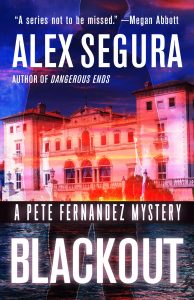Traveling through time is a recurring theme throughout Alex Segura’s body of work. It’s readily apparent in his work writing The Archies and their encounters with famous rock n’ rollers of yesteryear (and where he is the co-president of the company). While these adventures focus on the rollicking fun of the situation, Segura’s latest work plays around with a darker corner of this set-up for maximum emotional impact.
Indeed, traversing the curious wrinkles of time is manifested in Segura’s latest mystery novel Blackout. The novel (out tomorrow from Polis Books) is the fourth entry in the Pete Fernandez series of detective yarns. Pete is not your average hardboiled private eye. He’s a recovering alcoholic, a lover of great music, and a man in search of ultimate redemption (who, slowly but surely, is finally finding his way back in the world). Recently, I sat down with Alex to discuss the novel, but also to ask about the delicate balance of being a comics creator by day while writing mystery novels by night, why Miami is the perfect locale for a crime tale, and how to keep sane while keeping the creative juices flowing.

AJ FROST: Hi Alex! So nice to chat with you. Your new mystery novel, Blackout, I would argue, is your most ambitious yet. There are more dips and dabs between time periods and emotions. Where did the story and emotional tone for this new book come from?
ALEX SEGURA: Hi AJ! Well, first off, thanks for saying that. It means a lot. The story was a byproduct of the stuff I was reading—partially for “research” but mostly because I was interested in the topics. Stuff like cults, politics, Miami cold cases, and so on. Once I was through some of that, the kernel of the plot or mystery cropped up, and it dovetailed nicely with the emotional arc I wanted to give our detective, Pete Fernandez. I knew I wanted this to be a turning point for him, a chance to look back on his past and come to terms with it, so he could finally start living, as opposed to just wallowing in this “middle” state, feeling bad about his past mistakes and not feeling like he deserved to be part of the world.
FROST: This is our fourth go-around with Pete and, while he’s gotten better, he still travels around with a multitude of inner demons. As a writer—let alone a writer of hard-boiled crime yarns—what’s the most alluring and most demanding aspect of creating a flawed hero like Pete?
SEGURA: I think it is grist for the mill. I’m not interested in writing about the iconic hero, the perfect man or woman. Complex, flawed characters interest me as a reader; those are the books I gravitate toward. I’m keen to show Pete’s progression from passed out drunk when we meet him in my first novel, SILENT CITY, to now. And the journey isn’t over. In BLACKOUT, Pete’s better: he doesn’t drink and he’s working as private investigator. But he’s still dealing in a lot of the toxic behavior that almost killed him before. He’s living in exile in New York, avoiding his friends and trying to just sleepwalk through life. This book throws him on the mat and challenges him to change that.
FROST: As you said, we first find Pete living in New York, though he goes back to his home in Miami. I felt that Miami is such a nice change of pace from mystery novels that like to revel in the dank and dreariness of urban grime. What makes Miami the ideal location—for better or worse—for this type of crime story?
SEGURA: The contrast is really important. Miami is paradise: lush beaches, beautiful weather, palm trees. But the idea that there’s something dark lurking underneath, that the shiny veneer is somehow cracked, is compelling. I also try to take readers to places they might not see on vacation or through the eyes of a tourist.
I was born and raised there, and spend a lot of time there now, so I do my best to use the setting as much as possible. It’s such a great place for this kind of story, because there’s this strong juxtaposition between what Miami looks like and what it might be.

FROST: Let’s step back a moment. I know you’re an extremely busy writer with a lot of projects going on at any one time. Where do you find the moments to not only sit down and write your Pete Fernandez series, but also the work of developing the intricacies of the mystery? Basically, where do you find the time and not stretch yourself too thin?
SEGURA: I write at night, usually after we put our son to bed. But I’m constantly thinking about the book or open to ideas about the series. Honestly, I just don’t do much else beyond spend time with my family, work at Archie and write, and that’s fine. I think as a writer—even one who doesn’t make a full living off said writing—you have to treat it like a job. I find my most productive work comes when I do that – write a bit as often as possible, when the time arises and power through until I have a draft. I don’t have the bandwidth to get distracted by video games or movies, as much as I’d like to, for example. It’s just about doing the work, though it’s not as easy as it sounds.
FROST: Right. The balance is key. Some writers like to get through x number of pages a day, or y number of words. Or others will write when the fancy strikes. What is your process like? And how do you make sure that you stay on track with everything efficiently, and creatively?
SEGURA: My process is to jump on found time. If I have a minute here or there, I work. I have to be flexible and ready, and not glamorize the process. I don’t attach a lot of ceremony to writing. It’s a craft. I do it when I can. And those times add up and eventually, you have something complete. It helps to have an understanding spouse and family, too. I think what freezes up younger or newer writers is this idea of requirements or what needs to happen for the stars to align in order for you to write. I ignore all that; just write. Find the time, make the time, seize! No one is going to present you with a perfect opportunity on a silver platter.
FROST: One aspect of the book that I noticed prominently was the sprinkling of music. And it often seemed like music is used as a counterpoint to whatever action is happening at any particular moment. What does the inclusion of music, especially in a medium where there is no sound per se, mean to you on a creative level?
SEGURA: They’re landmarks, really. Ways to connect with readers on a different level, I guess. I think about music a lot, and how it plays into different scenes and what my characters might listen to. We know from his earliest moments that Pete is a music nut, so the references help push that forward. I think it makes Pete more relatable, too, and it creates a soundtrack of sorts for the book—the different sections, for example, are song titles.
FROST: I don’t want to divert too much attention away from Pete, but I have to ask: Does your mind go to different places when you work on your project? What I mean to say is: Does working on Archie activate one part of your brain, and the Pete stories another? Or do they both access the same reservoir, as it were?
SEGURA: Yes and no. I think I’m the same writer, just doing different things. It’s good to be flexible and work out different writerly muscles. Comics are a team effort, so that is more about doing your part and passing the ball at the right time in the hopes of winning as a team. In a novel, you’re flying solo, for the most part, and other people come in at the end to fine tune your work. They’re extremely different, but also gratifying in different ways.
FROST: For you, what is the future looking like for Pete and this series of novels? And beyond novels, too! I’m not sure how much you can talk about this, but am I correct that the series has been optioned for television?
SEGURA: You are correct! It’s early days, but I’m really excited to be working with the team that optioned the books. They get Miami and love the books. I’m eager to see where things go. In terms of the books, I have one more Pete novel coming out next year, titled MIAMI MIDNIGHT. A lot of it hinges on the end of BLACKOUT, so I’m gonna stay mum on that for now!
FROST: Congratulations! One final question: Besides curling up with a good mystery, what do you want readers to walk away with after reading the (mis)adventures of Pete? And, as his creator, where do you see him going in the years to come?
SEGURA: I want them to feel invested in Pete and his journey. To me, the novels work on those two levels – the mystery, which is of course, extremely important, but also Pete and his quest to, well, get better. To be a better person and make up for his past mistakes. I think in BLACKOUT, you see those two things merge into one story, and that was intentional. I hope people find him to be genuine and someone they can relate to, even if the circumstances are intense and cinematic. In the coming years, I hope I can keep pushing him forward, and slowly peel away stories from his past and show how they reflect on his present.
Blackout release May 8 from Polis Books.
Follow Alex on Facebook & Twitter.







